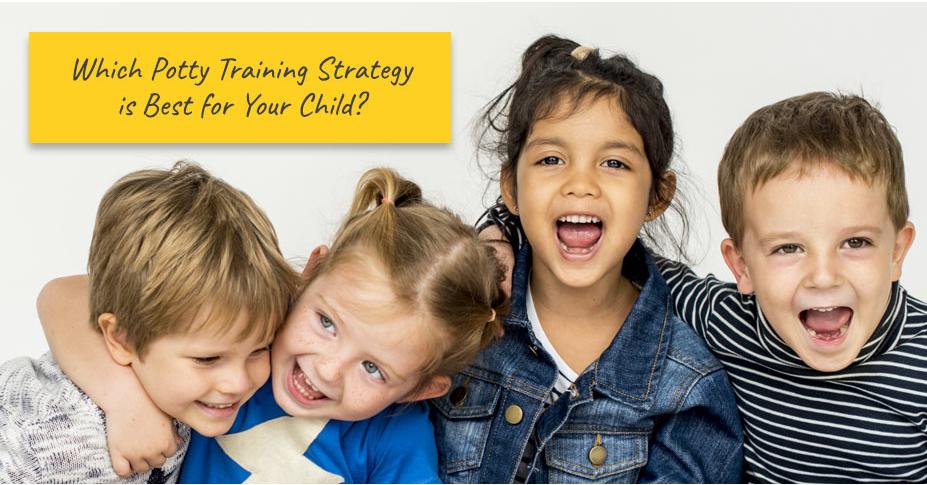If all children learn best through play, your child learns best through her favorite kind of play. Some children are happiest in wide open spaces while others could play contentedly in a cozy corner. Some children get lost in pretend activities while others want to take apart real objects and see how they work. You want to pick playful potty strategies based on your child’s genuine interests and personality.
Take our quiz to find out what kind of strategy will work best for YOUR child!
Which Potty Training Strategy is Best for Your Child?
1) Pick a word to describe your child.
A. Active
B. Talkative
C. Thoughtful
D. Expressive
E. Friendly
2) How do they like to spend their free time?
A. Running, jumping, skipping—anything, as long as they’re moving
B. Telling you all about the book, toy, or show they just discovered
C. Learning new things about the world around them
D. Singing and dancing for their adoring fans
E. With friends; the more, the better!
3) Their favorite toy is…
A. Ball
B. Puppet
C. Puzzle
D. Microphone
E. Board game
4) When it comes to problem-solving, your child is most likely to…
A. Try the first thing that comes to
mind
B. Talk through the problem
C. Ask lots of questions
D. Imagine and act out possible
outcomes
E. Do what their friends would do
5) When they grow up, they want to be…
A. Athlete
B. Reporter
C. Scientist
D. Actor
E. Politician
Mostly As: The Doer
A physically precocious child likes to do first and reflect afterwards. Appeal to her sense of adventure and need for action. Keep her body busy and you will engage her mind; ignore her body and she will be bored and distracted. Because potty training requires self-awareness, you must hook the verbal-cognitive message onto predictable actions.
Play beat the clock to get to the bathroom as fast as she can, give “high fives” if she makes it to the potty, or do an “end zone potty dance” (or try all three). This is the child of “big action,” so don’t slow her down with buttons and zippers. Your potty training style has to be quick and to the point.
Mostly Bs: The Talker
A talkative child has abundant language and loves explanations. She listens to the potty training plan and rephrases each step in her own words. She repeats key phrases to remind herself what to do next, and gains control over her action by talking. If you are a parent with similar verbal strengths, this is easy and natural for you. If you have other strengths, your child’s need for talking may drive you a little crazy.
Read and discuss potty books and stories with your child. You can talk about your potty plans when she wakes up in the morning and talk about today’s potty adventures before bed at night. You might want to stand outside the bathroom door and listen as she sings or talks to herself through each and every potty time. Pay attention to the words she uses; you may need to borrow from your child’s verbal repertoire at another time.
Mostly Cs: The Thinker
A mini-intellectual loves figuring out how things work. She may be one of those children that seem wise beyond her years. She enjoys working on logical puzzles, sorting, sequencing, matching, and counting. She may also love books and self-designed science projects, especially figuring out where the poop goes when you flush the toilet.
Play games with your child that organize and collect vital potty facts. For example, how many potty candles were collected today for her celebration cake? And is that number more or less than yesterday?
This potty-goer might prefer potty sequence cards instead of a less challenging potty photo book. You can make a stack of potty action cards and let your little thinker arrange in temporal and logical order: (1) diaper wearing; (2) open bathroom door; (3) take off pants; (4) sit on potty; (5) look at a book while on potty; (6) wipe tushie; (7) flush toilet; (8) put on pants; (9) wash hands; (10) high five. Start with five actions, and then add more.
Mostly Ds: The Performer
An imaginative child excels at imitation and pretend play. She is observant, engaged, and attuned to the rich details of everyday actions. She may embellish play with narrative themes or characters. Your little performer might assume new identities or invite imaginary friends into her potty adventure.
Incorporate themes from her favorite stories into your potty training strategies. She will be interested to hear whether her favorite characters are using diapers or underwear. Fictional characters are her dear friends who can be part of her potty learning adventure. Rehearsing those potty training skills in pretend play is her personal actor’s studio.
Mostly Es: The Socialite
A little social butterfly makes eye contact easily, encouraging social connections, like any great politician. She initiates and welcomes social interaction. She’ll happily be the last to leave the party. She learns best with others rather than alone.
Base your potty training strategies on the motto “the more the merrier!” She’s the child who wants a hands-on potty partner to hold her hand on the way to the potty and to share her successes. Line up all her favorite potty role models, real and fictitious. This little party girl is motivated by people. Call all her very important people with potty updates. She’ll join the club if you can show her they’re waiting for her grand entrance. She’s ready for a potty party!
Want more potty training tips? Check out "Creating a Child-Centered Potty Training Experience" now!
Give your child a boost of confidence with a personalized book about this always-exciting, sometimes-challenging milestone. Big Boys Go Potty and Big Girls Go Potty ask your child about their experience going potty, offering encouragement when they have an accident and praise when they succeed.

|

|

